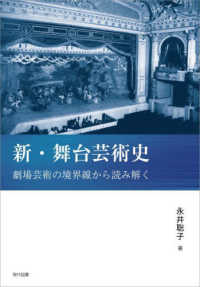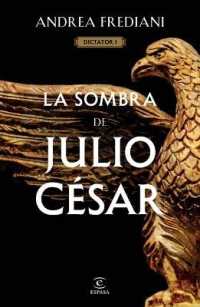- ホーム
- > 洋書
- > 英文書
- > Philosophy
Full Description
Challenging the triumphalist narrative of Enlightenment secularism.
According to most scholars, the Enlightenment was a rational awakening, a radical break from a past dominated by religion and superstition. But in Let There Be Enlightenment, Anton M. Matytsin, Dan Edelstein, and the contributors they have assembled deftly undermine this simplistic narrative. Emphasizing the ways in which religious beliefs and motivations shaped philosophical perspectives, essays in this book highlight figures and topics often overlooked in standard genealogies of the Enlightenment. The volume underscores the prominent role that religious discourses continued to play in major aspects of seventeenth- and eighteenth-century thought.
The essays probe a wide range of subjects, from reformer Jan Amos Comenius's quest for universal enlightenment to the changing meanings of the light metaphor, Quaker influences on Baruch Spinoza's theology, and the unexpected persistence of Aristotle in the Enlightenment. Exploring the emergence of historical consciousness among Enlightenment thinkers while examining their repeated insistence on living in an enlightened age, the collection also investigates the origins and the long-term dynamics of the relationship between faith and reason.
Providing an overview of the rich spectrum of eighteenth-century culture, the authors demonstrate that religion was central to Enlightenment thought. The term "enlightenment" itself had a deeply religious connotation. Rather than revisiting the celebrated breaks between the eighteenth century and the period that preceded it, Let There Be Enlightenment reveals the unacknowledged continuities that connect the Enlightenment to its various antecedents.
Contributors: Philippe Buc, William J. Bulman, Jeffrey D. Burson, Charly Coleman, Dan Edelstein, Matthew T. Gaetano, Howard Hotson, Anton M. Matytsin, Darrin M. McMahon, James Schmidt, Céline Spector, Jo Van Cauter
Contents
Acknowledgments
Introduction
Part I. Lux
Chapter 1. Via Lucis in tenebras: Comenius as Prophet of the Age of Light
Chapter 2. Whose Light Is It Anyway? The Struggle for Light in the French Enlightenment
Chapter 3. The "Lights" before the Enlightenment: The Tribunal of Reason and Public Opinion
Chapter 4. Writing the History of Illumination in the Siècle des Lumières: Enlightenment Narratives of Light
Part II. Veritas
Chapter 5. Another Dialogue in the Tractatus: Spinoza on "Christ's Disciples" and the Religious Society of Friends (Quakers)
Chapter 6. A Backward Glance: Light and Darkness in the Medieval Theology of Power
Chapter 7. Lumen unitivum: The Light of Reason and the Aristotelian Sect in Early-Modern Scholasticism
Chapter 8. The Aristotelian Enlightenment
Part III: Tenebrae
Chapter 9. Secular Sacerdotalism in the Anglican Enlightenment, 1660-1740
Chapter 10. Refracting the Century of Lights: Alternate Genealogies of Enlightenment in Eighteenth-Century Culture
Chapter 11. Enlightenment in the Shadows: Mysticism, Materialism, and the Dream State in Eighteenth-Century France
Chapter 12. Light, Truth, and the Counter-Enlightenment's Enlightenment
Contributors
Index








